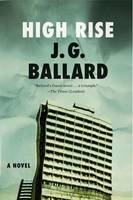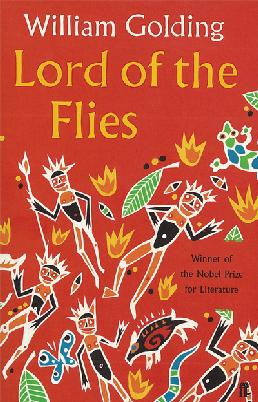 I have to confess that the only reason I picked up J. G. Ballard's 1975 novel of inevitable social decline in a well-to-do apartment block was because I'd read an article about the movie version due out later this year starring Tom Hiddleston.
I have to confess that the only reason I picked up J. G. Ballard's 1975 novel of inevitable social decline in a well-to-do apartment block was because I'd read an article about the movie version due out later this year starring Tom Hiddleston.
I'd watch Tom Hiddleston in anything, so I figured I'd read the book before the movie comes out. And in my own mind I think I was already imagining an action movie with a British Bruce Willis before I even cracked the cover of the book. Which was a bit silly, really. Having read J. G. Ballard before I should have realised he is not Michael Crichton. His books, though they may have action, are not the "novel as screenplay" blockbuster variety. They are rather more harrowing than that.
High-rise follows three main protagonists, all of whom live in a new high-rise apartment block in London which is populated by nice, reasonably well off types - studio technicians and air hostesses, tax consultants, dentists, book reviewers, and doctors. The children are clean and well-fed, the furnishings are aggressively tasteful.
Naturally we should expect things to take a turn for the worse, but Ballard lets us know from the very first sentence where this is all going -
Later, as he sat on his balcony eating the dog, Dr Robert Laing reflected on the unusual events that had taken place within this huge apartment building during the previous three months.
Which is possibly one of the best opening lines of a novel I've ever read but if you've got better ones I'm sure you'll share them in the comments.
Robert Laing is a divorced doctor and med school academic who lives in the middle sector of the building, on the 25th floor. The other two main characters are Anthony Royal, the architect of the high-rise who lives in a penthouse on the 40th, and Richard Wilder a documentary filmmaker who lives with his wife and two sons on a lower floor. They each represent one of the social strata that the apartment block separates into once "hostilities" begin. I suspect the names "Royal" and "Wilder" are not accidents.
Needless to say dog-barbeques are far from the worst thing that occurs within confines of the apartment building over several months. As often happens in dystopian fiction society recreates itself, evolving and changing, with barbarism becoming the lingua franca. It's Mad Max made of concrete.
Without knowing it, he had constructed a gigantic vertical zoo, its hundreds of cages stacked above each other. All the events of the past few months made sense if one realised that these brilliant and exotic creatures had learned to open the doors.
 Or perhaps High-rise is an urban Lord of the Flies but instead of being marooned the inhabitants of the island simply refuse to leave. In this respect the book reminded me of Chuck Palahniuk's Haunted in which wannabe novelists are "trapped" in a theatre as part of a writers' retreat. They can leave any time they like but won't, even as food becomes scarce. They all become monstrous in pursuit of survival... and the great story that will make them bestselling authors.
Or perhaps High-rise is an urban Lord of the Flies but instead of being marooned the inhabitants of the island simply refuse to leave. In this respect the book reminded me of Chuck Palahniuk's Haunted in which wannabe novelists are "trapped" in a theatre as part of a writers' retreat. They can leave any time they like but won't, even as food becomes scarce. They all become monstrous in pursuit of survival... and the great story that will make them bestselling authors.
In the high-rise survival is down to luck, tribal alliances, force of will, or as Wilder discovers - actually being the fittest.
...the higher up the building he climbed, the worse the physical condition of the residents - hours on the gymnasium exercycles had equipped them for no more than hours on the gymnasium exercycles.
That passage was the closest I came to a laugh during the book, and it came in the form of a wry chuckle. The problem with Ballard is much the same issue I have with Palahniuk actually - none of his characters are especially likeable.
Some authors can take an unsympathetic character and let you live in their skin to the extent that their likeability isn't important - you empathise with them regardless. You care what happens to them despite their flaws. In High-rise I felt like everyone was a brutal lunatic and I wanted to be rid of them as soon as possible. In the end I just wanted the book to be over so I could share my headspace with normal non-dog-eating individuals.
The saving grace of the book, for me at least, was a small section at the back, an interview with the author. As anyone who's read the book, or seen the film of Empire of the Sun will know, Ballard's family were living in Shanghai during WWII when the Japanese invaded and he spent several years in an internment camp. In the interview he reveals how this experience of observing a society shaken to pieces influenced him, and which ultimately comes out in High-rise. -
I suppose one of the things I took from my wartime experiences was that reality was a stage set. The reality that you took for granted - the comfortable day-to-day life, school, the home where one lives, the familiar street and all the rest of it, the trips to the swimming pool and the cinema - was just a stage set. They could be dismantled overnight, which they literally were when the Japanese occupied Shanghai and turned our lives upside down.
Though the writing is elegant and sharp I can't say that I actually enjoyed High-rise. It remains to be seen whether the film version will "Hollywood-ise" the novel to make it more palatable to a broader audience who might actually like to see Tom Hiddleston climbing elevator shafts in a singlet. I for one would welcome it.



Add a comment to: High-rise: J. G. Ballard’s vertical zoo